Male-Female Friendships in Anime: Can We Really Be Just Friends?
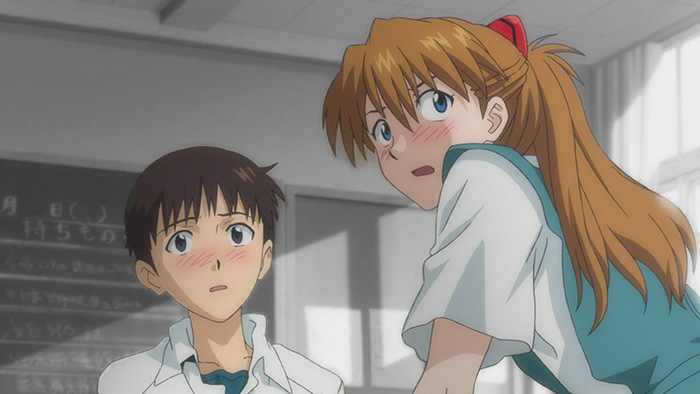
Anime as an art form has long been criticized for its portrayal of female characters; in examining both historical and modern examples, it’s not particularly difficult to see why. So often female characters are depicted purely as sexual objects: their personalities are completely flat while their bodies are anything but. Instead of being granted an independent personality of their own, they exist as subservient to the male main character, with his schoolboy crush on the female protagonist being a main motivation to win whatever battle he’s fighting.
To further this anything-but-egalitarian dynamic, male-female friendships, when they are in fact depicted, often divert to a romantic relationship or serve to add a romantic subplot to the story. Otherwise, they perpetuate the submissive gender expectation for women by depicting female characters as helpless, eyelash-batting damsels in distress that men are tasked with saving.
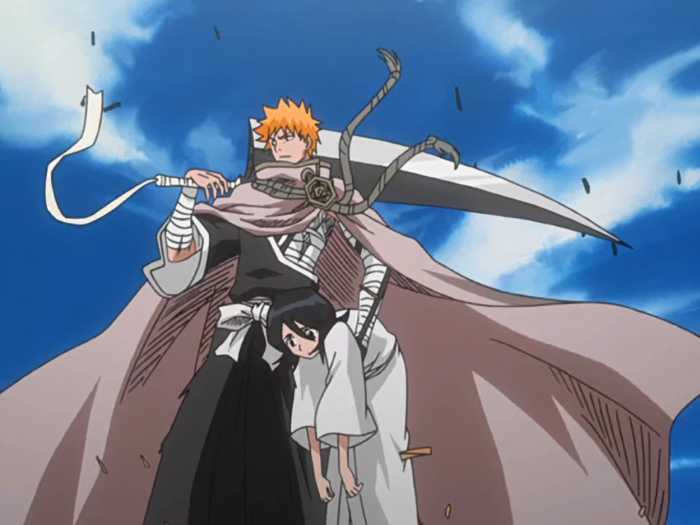
However, with an increase of female anime fans and an overall more feminist and progressive worldview developing within our society, a trend of stronger, more well-developed female characters may be unfolding within the medium of anime. Even having acknowledged this, it is unclear whether more positive depictions of male-female friendships will be produced in future anime series, or if romantic subplots and oversexualization of women will continue to be common themes.
Neon Genesis in Adherence to Stereotype
A depiction of the typical expectation of male and female friendships is visible in Neon Genesis Evangelion, the 1995 cult-classic anime by Studio Gainax. The series focuses on the misadventures of 14-year-old Shinji Ikari, a young boy living in the futuristic city of Tokyo-3. Fifteen years prior to the start of the story, half the global population has been eliminated by a mysterious incident in which giant robot-like mechanical beings known as “Angels” have crashed into the face of the Earth. Shinji, along with two other children, is now being recruited by his father, the commander of an anti-Angel organization, to fight against them by piloting a robot mecha known as an “Evangelion” or simply an “Eva”. Conflicting and convoluted feelings arise for Shinji when he begins a tumultuous friendship-slash-forbidden-crush relationship with his fellow Eva pilot, Asuka.
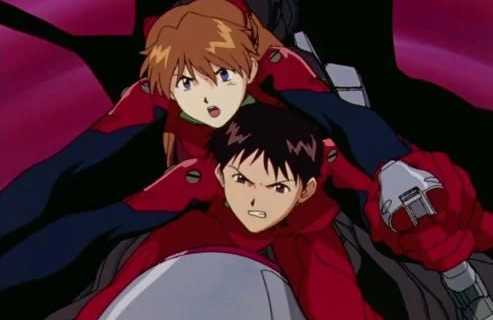
Throughout the series and its accompanying films, Shinji and Asuka work and live closely together, and are forced to place a great deal of trust in each other as they fight in often life-threatening battles against the Angels. From the point of initially meeting Shinji, Asuka is brash, competitive, and rude— for lack of a better term, your typical bitch. She has a neurotic need for dominance and control over her environment, including Shinji, as instead of offering kindness towards him, she immediately insists upon competing to establish who the superior Eva pilot is by means of synchronization rates with their respective Evas.
Although they are made to live together as co-pilots, their efforts to synchronize their movements or collaborate on various tasks prove to be unsuccessful on Asuka’s part (no surprise here), as she is unwilling to cooperate with Shinji. She removes her belongings from their shared bedroom into a different room, refusing to share a space with Shinji, going so far as to refer to the door between them as the impenetrable “walls of Jericho.”
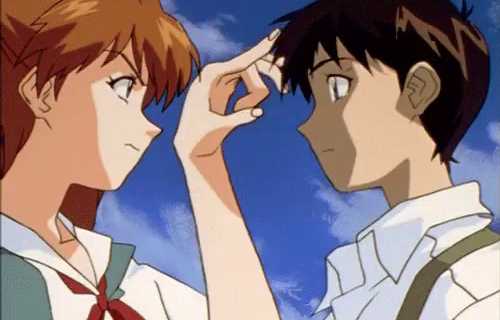
You’d think this clear animosity would spell the end of any chance of the two getting together, but that isn’t quite the case in Evangelion. Despite this apparent unfriendliness between them, romantic implications are equally present within the two pilots’ relationship. The dynamic between them begins to shift towards episode 15. Two other characters in the series, Misato and Kaji, are depicted as beginning their engagement in a romantic relationship. As the barely-censored not-quite-sex scene plays out, strategic cuts of Shinji and Asuka are layered in, depicting them in mirrored physical positions and engaging in similar activities.
This draws attention to the conflict between them, but rephrases it in a possibly romantic context— could it be that their incessant bickering is indicative of secret feelings? Signs point to yes when Asuka asks Shinji to kiss her later in the same episode, citing boredom. Shinji complies, but holds his breath and doesn’t actively return the kiss, causing Asuka to storm out of the room in anger and dismay. (Yikes.) As is often the case in popular media, the male-female relationship here depicted has progressed from platonic to somewhat romantic, reinforcing the common notion that men and women cannot possibly hope to ever coexist solely as friends.
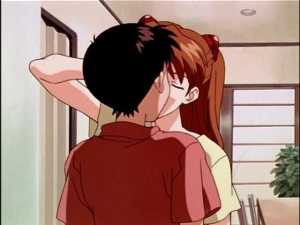
Only later in the series do viewers gain a more accurate insight into Shinji and Asuka’s true feelings towards each other. In episode 22, an Angel attacks Asuka by way of infiltrating her mind and forcing her to relive her various traumas. During this horrifying sequence, Asuka’s inner pain and loneliness is revealed. She was abandoned by her family and forced to live a life of violence by becoming an Eva pilot. Alone and lacking emotional connection, she became harsh and dismissive as a self-protective coping mechanism, explaining her unkindness towards Shinji. We see her for the first time not as the pseudo-adult and capable Eva pilot, but for who she truly is: a scared, lonely little girl lashing out at the unpredictable world around her.
When reminiscing on her initial meeting and subsequent mistreatment of Shinji, she resents his inability to see past her facade, thinking, “You won’t do anything, you won’t help me! You won’t even hold me!” In spite of her outward hostility, Asuka truly desires closeness, intimacy, and possibly romance with Shinji, but is too insecure to express it. Her choice to close herself off to the possibility of love or intimate relationships has led her to regret the chance she missed out on with Shinji, and she now has likely permanently damaged their relationship due to her own actions.
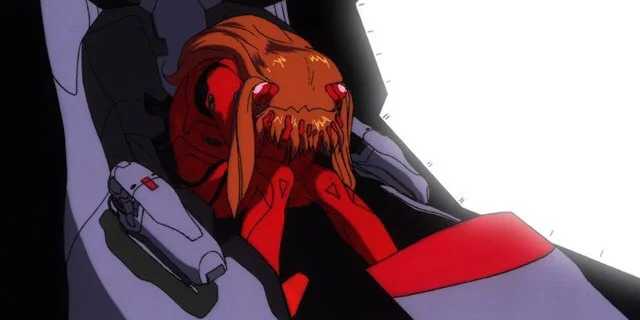
On the contrary, Shinji’s true feelings towards Asuka skew towards the sexual. Similarly abandoned by his family and forced to undergo the traumatic experience of becoming an Eva pilot, Shinji is desperate for acceptance; the internet-savvy anime fan will recognize his dismay as the subject of many a Twitter meme. He is tormented by his need for positive perception, leaving him desperate to please others, as he realizes in a mental unraveling similar to Asuka’s. While he initially desired closeness and a mutually comforting relationship with her, he comes to realize that this is impossible given the nature of Asuka’s treatment towards him. When she pushes his friendly advances away, telling him, “It’s not like you understand me at all,” he agrees. “There’s no way I could understand you,” he says. “Because you don’t say anything.”
With these hopes of acceptance and love dashed, Shinji turns to viewing Asuka in a sexual light, the only possible remaining viewpoint. The dark nature of this attraction is shown in more depth during a controversial scene in which Shinji masturbates over Asuka’s unconscious body following an Angel attack. Being unable to form any sort of emotional connection, he resorts to indulging his sexual fantasies, afterwards delivering the fitting line echoed by so many viewers: “I’m so fucked up.” Later, Asuka tells him, “I know that I’m your jerkoff fantasy … If you can’t be mine and mine only, I don’t even want you.” This sequence of events emphasizes the disconnect between both parties’ desires, and the subsequent pain that it causes, both of them being forced to resort to a purely sexual relationship when they find they are unable to develop the intimate one that they both truly desire.
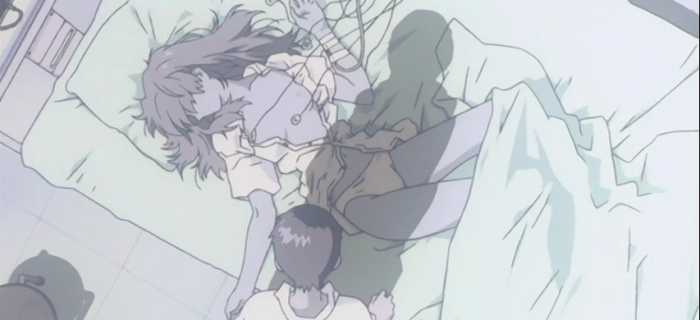
Attack on Titan: A New Standard or the Same Old Thing?
So if male-female relationships in 90s anime seem to crash and burn in a hormonal rage, how do the ones depicted in modern anime fare? One of the most prominent anime airing today, the 2013-2023 anime series Attack on Titan, may be able to provide an answer to that question. Similarly to Evangelion, the story focuses on a young boy, Eren Jaeger, whose hometown is invaded by man-eating humanoid giants known as Titans. Eren, along with his adoptive sister Mikasa, joins an army of Scouts with the goal of exterminating every Titan from the Earth. Eren and Mikasa’s relationship, however, is equally as confusing as it is complicated, due to it flip-flopping between the realms of platonic, romantic, and familial at different parts throughout the story.
The relationship between the two begins in childhood (not a great foundation of romance, but hey, you never know) with a pure act of devotion untainted by sexual or other ulterior motivations. After Mikasa’s family is killed, she is rescued and taken in by the Jaeger family. Eren notices her shivering out of terror, and offers her his scarf, wrapping it around her. This introduction to Mikasa’s character is one that paints her as weak and incapable of defending herself, instead needing to be rescued by a male character. Eren’s saving of Mikasa sparks her absolutely exhausting adoration and loyalty to him, as he serves as a motivator for essentially all of her life goals.
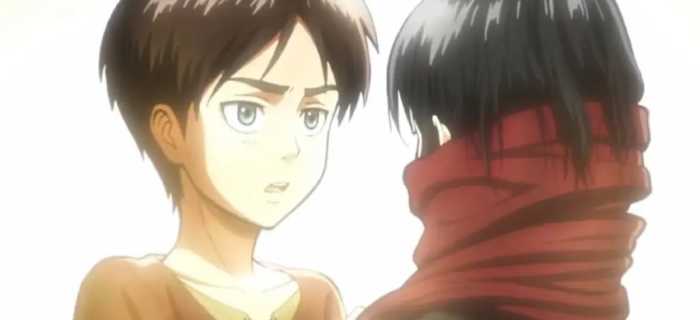
Throughout the series, she is shown to have almost no desires or interests outside of protecting Eren; the boy becomes her life’s purpose, taking precedence over absolutely everyone and everything else. Whenever Eren expressed interest in joining the anti-Titan army, Mikasa vehemently disagreed and argued with him against the idea. However, once he ultimately enlists, she changes her mind with the flip of a switch— all of a sudden, she’s totally gung-ho to beat some Titan butt. Eren remains her utmost priority throughout the series, as Mikasa demonstrates that she is willing to slaughter her close comrades if they happen to be posing a danger to his life.
In times of crisis, she can always be counted on to keep a level head, and never fails to come to Eren’s rescue when he proves incapable of doing so himself. Their mutual childhood friend, Armin, describes Mikasa as “a woman who’s always valued [Eren] over everything, even her own life.” The countless instances of her putting her own life at risk for Eren’s sake reinforce Mikasa’s position as subservient and submissive to Eren’s will, further insinuating that male-female friendships can’t exist in both a platonic and an equally positioned context.
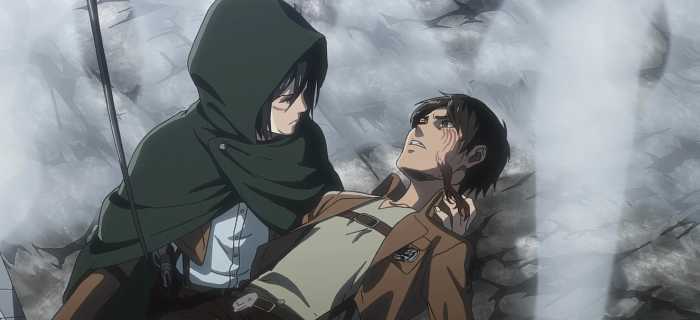
Mikasa’s narrow-minded view of Eren as a savior is somewhat ironic within the world of Attack on Titan, where she is portrayed as one of the most powerful characters in the show, ranked as their army’s strongest soldier. While some female cadets are unable to keep up with their male counterparts, Mikasa is able to not only fight alongside them, but annihilates them without so much as breaking a sweat. She takes over in battles when Eren is unable to defeat a strong enemy, again taking a protective and physically powerful role over him, almost simultaneously subservient and dominant, as confusing and contradictory as it is. Her physical dominance over her male counterparts is a key difference in her character portrayal as compared to Asuka’s, presenting a flipped reversal of the expected male-female character dynamic and possibly enabling future anime series to do the same.
Ultimately, however, Mikasa and Eren’s true feelings towards one another remain repressed and unspoken, similarly to Evangelion’s Asuka and Shinji. Throughout the four seasons of the series, the two never progress past the point of platonic intimacy. Like Shinji and Asuka, both parties are too afraid or potentially too insecure to confess their feelings to the others’ face. In the concluding arc of the series, Eren finally confronts the tension between them and addresses Mikasa’s extreme devotion and view of him as her savior. “Why do you care so much about me? … Is it because I saved you when we were little?” he says, eventually asking point-blank with frat-boy confidence, “What am I to you?” Mikasa displays clear nervousness, but, like Asuka, chooses to be dishonest and deny her true feelings, responding with the classic cop-out “You’re family.”
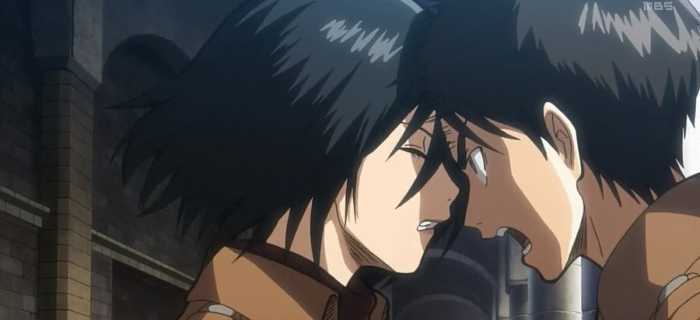
Eren mirrors Shinji’s attitude towards Asuka in that he is also unable to communicate his affection towards Mikasa. He escalates the situation to the point of cruelty and toxicity when, afraid of her growing closeness to him, he delivers the intentionally malicious and heartbreaking line, “I’ve always hated you, Mikasa.” However, when their childhood friend, Armin, suggests that Mikasa would benefit from moving on from Eren, he throws a hissy fit more suitable to a nine-year-old than a nineteen-year-old: “No, I don’t want that! Mikasa finding another man? I want her to think about me and no one else.” Like Neon Genesis Evangelion, this paints male-female friendships in a negative light, with suppressed feelings causing distress to both parties involved.
Looking Ahead to Future Trends in Depiction
The star-crossed lovers of both Attack on Titan and Evangelion are similar in the tragic aspect of their stories, but they share similar aspects past this. In the context of these two examples across time periods, the unhealthy aspects of male-female friendships as presented in anime appear unchanged. Both Asuka and Shinji’s and Mikasa and Eren’s relationships are unable to exist without some component of sexual or romantic attraction, reinforcing the long-held stereotype that men and women cannot enjoy simply platonic relationships. Both pairings perpetuate unhealthy attitudes around male-female friendships by depicting the female character as purposeless or subservient to the male.
Mikasa sees no point to being alive if she’s not able to protect Eren, and often places herself in a lower position in order to bend to his will. Asuka, similarly, is depicted as inferior to Shinji, scoring significantly lower than him in tests of fitness as an Eva pilot, much to her frustration. Devastated to learn that she can no longer function as an Eva pilot, she loses all sense of purpose and self when she is unable to further work with Shinji. Both women’s identities are absorbed and entangled in their corresponding male friends, communicating a negative message to viewers about women’s position and status in the context of relationships with men.
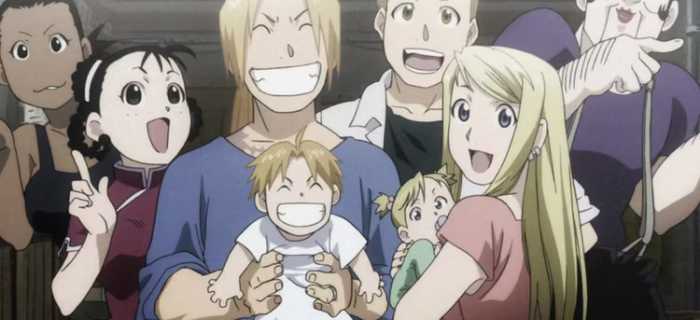
However, change has undoubtedly occurred in the way that women and their relationships with men are presented within anime. It is possible that an increasingly progressive worldview or an increasingly socially aware generation has created an increased demand for positive female representation. In comparing 1995’s Neon Genesis Evangelion and Attack on Titan’s 2013-2023 run, a decrease of sexual themes and oversexualization of women is clear. While Asuka is often depicted as an object of Shinji’s sexual attraction in Evangelion, to the point of explicitness in certain scenes, Mikasa never appears scantily-clad in Attack on Titan. Furthermore, no sexual attraction is ever indicated on Eren’s part, indicating progress in the sense that a male character is shown to be motivated towards his female partner on a deeper level than pure physicality. And for what it’s worth, the show certainly doesn’t contain a sequence of Eren jerking it over Mikasa’s unconscious body— just saying.
While most of Mikasa’s character arc revolves around Eren, she’s able to enjoy and maintain positive relationships with other male characters without engaging in a romantic relationship. The series also contains several female characters that are shown to be competent fighters without show tendencies towards romance at all. The most crucial difference between the dynamics presented in the classic Neon Genesis Evangelion as compared to the modern Attack on Titan is Mikasa’s ability to break away from Eren’s cruelty and mistreatment towards her, and to eventually become secure in her own identity without him.
After Eren expresses his supposed longstanding hatred of her, she removes the scarf that he gave her as a child, serving as a symbol of her dedication to him. Since this instance is the first time ever in the series that she has been viewed without Eren’s scarf, the impact is monumental: her self-respect and values exceed even her lifelong love for her friend.
In contrast, Asuka, by the end of Evangelion, still finds her identity entangled with Shinji’s; she is demeaned by way of begging for affection from him that she will never receive. In her multifaceted strength, Mikasa’s character conveys the message that modern women can exist on an equal level to men in both physical and intellectual capacities, without being viewed as sexual objects.
While positive progress has been made in terms of female character depictions within the anime medium, there is still a significant way to go before true equality is achieved. “Fan service” characters and sexually explicit scenes are still commonly included in otherwise unrelated or unneeded contexts, and female characters are still more often than not weaker and more submissive than males.
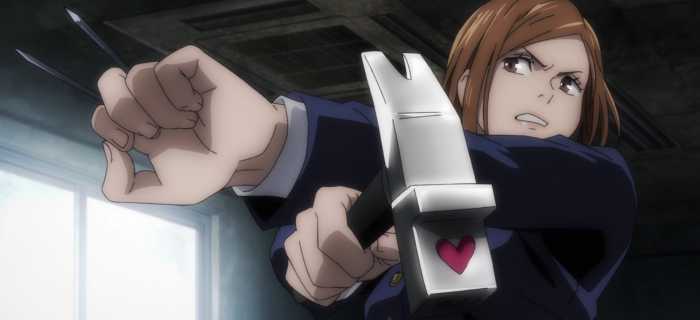
Neon Genesis Evangelion’s Asuka is, despite her sexualization, an excellently-written and well-developed character, but modern-day series such as Attack on Titan are causing a shift towards advocacy for their female viewers. By including strong role models that they can look up to, they are demonstrating to young women that they are capable of standing on the same stage as their male counterparts, and that their value is far beyond just a pretty face.
What do you think? Leave a comment.




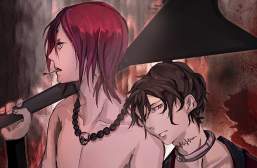
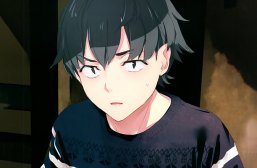

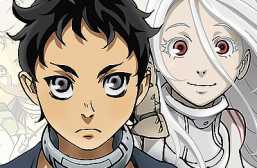
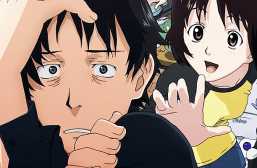
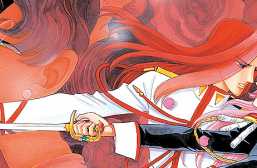
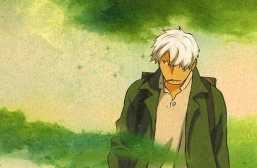
Great article, and topic! Can people post suggestions on amazingly written female characters in anime? Thank you!
Kill la Kill. Satsuki is my hero. Don’t let the skimpy outfits scare you off. I’m a woman, and a feminist at that, and I really enjoyed KlK.
KLK is chock full of strong female characters- the unforgettably plucky heroine Ryuko, her nemesis (and Glorious Leader) Satsuki, and her airheaded but fearless BFF Mako.
The men are mostly naked too.
Claymore has a strong leading female character who can hold her own rather well. The plot line is amazing and there’s hints of romance throughout the show. Only bad thing is its only a season long 🙁
Adding that the manga is better. Shit gets real after the anime ends. (There was also a terrible anime-only ending, so just ignore that)
My favorite part of the series is how hilariously overpowered the main villain is. There’s a giant monster spewing out thousands of building-busting regenerating life-draining mindless morphing murdermonsters a day and that’s the second biggest problem after Priscilla.
I for one really enjoyed the characters in Yuuki Yuuna is a Hero. Especially Yuuki Yuuna.
Psycho Pass has a well developed and interesting female character who started out weak but became strong and independent.
Ergo Proxy and Hellsing Ultimate. 2 of the most badass female characters you week find in anime.
What do people think of Motoko in Ghost in the Shell?
Motoko is only female in appearance. In GitS, there’s actually no confirmation at all that her brain originally belonged to a female, and her joke about being on her period at the start has been taken by some as evidence that it’s a male brain to make a crude joke like that (I don’t really buy that).
Girls apparently can’t do anything without the help of a dude lol. This isn’t a concept only found in anime, sadly.
Kyoukai no Kanata is a relatively short show (12 eps), and features an excellent romance. The male MC relies on his partner in battle as often as she relies on him.
I just opened 14 tabs of anime thanks to you all 😛 haha
Mostly every girl in monogatari is a very strong and well written. Great character development fun to watch (even worst girl).
Most well written anime have well written female characters, I mean, Legend of the Galactic Heroes has great female characters (even if they are introduced quite late).
Both Satoshi Kon’s Millenium Actress and Perfect Blue have really well written main heroines.
I think the female characters were way stronger in Angel Beats than the male ones
I love the way the female characters work in Trigun. They have a tremendous amount of dialogue between them and they can hold their own in an (ordinary) fight.
This article is interesting
Great article! It was a pleasure to edit, and, it’s great to see it live! Very in-depth and thought-provoking! Thank you for the enjoyable read!
How about Spice and Wolf. The chemistry of the two main characters carries the show.
I guess that fits but they start to flirt after a while. =)
Perfect example. Fantastic show.
Try Isshukan friends. It focuses on the friendship of a guy and a girl with the caveat that the girl’s memories of her friends reset at the start of each week.
Most Studio Ghibli movies revolve around a male/female friendship and it’s always done very well.
For representation, pretty much the entire female cast of the Monogatari series but as a stand out, Nadeko, Senjougahara, and Hanekawa.
Especially Hanekawa!
Yup! Hanekawa is exceptionally well-done character.
My five favorite strong female characters:
* Kinomoto Sakura (Cardcaptor Sakura)
* Anne Shirley (Anne of Green Gables)
* Harukaze Doremi (Ojamajo Doremi)
* Yukino Miyazawa (Kare Kano)
* Oscar François de Jarjayes (Rose of Versailles)
Which are yours?
Mine:
-Violet Evergarden from Violet Evergarden
-Tsubasa Hanekawa from Monogatari series
-Hitagi Senjougahara from Monogatari series
-Oshino Shinobu from Monogatari series
-Rei Ayanami from Evangelion
Well-written according to me:
Asuna Yuuki (Sword Art Online)
Shinobu Oshino (Monogatari Series)
Ishtar (Fate Series)
Shiki Ryougi (Kara No Kyoukai)
Kurisu Makise (Steins;Gate)
Ryuko Matoi (Kill La Kill)
Tanaka Asuka (Hibike! Euphonium)
Tsubasa Hanekawa (Monogatari Series)
Mikoto Misaka (Toaru Series)
Oumae Kumiko (Hibike! Euphonium)
I really like your list
Off the top of my head :
1. Misaka Mikoto (To Aru series)
2. Matsumae Ohana (Hanasaku Iroha)
3. Chisaki Hiradaira (Nagi no Asukara) I still rooted for Manaka though
4. Hinata Kawamoto (3-gatsu no Lion)
5. Misakino Kukuru (Aquatope)
6. Shimamura Hougetsu (Adachi to Shimamura)
Casca and Farnese from Berserk, all female main characters in Evangelion (Asuka, Rei, Misato), all of the magical girls in Madoka Magica, Violet Evergarden, Suzuha from Steins;Gate, and Faye from Cowboy Bebop.
Kaori from your lie in April is a fantastic character and personally is my favourite female character in anime (not necessarily who I consider the best) as are the rest of the YLIA characters.
How about Phos from land of the lustrous?
I’d say Phos is genderless.
Attack on titan has great women representaiton. And I want to highlight Revolutionary Girl Utena, Madoka Magica, Princess Tutu. Those three complement each other really well.
For romantic stuff, Rurouni Kenshin: Trust & Betrayal, and Spice and Wolf have my favorite pairings in anime. Like, the kind of stuff that makes me jump like a fangirl, even if I am usually left cold by most romance in anime, and the female protagonists are really interesting and believable.
NGE has well a developed cast of female characters.
My female friend REALLY loves Asuka. And it’s TV version of NGE. She says she loves Asuka’s jealous and dirty side to Kaji and also Misato or adulthood in general, it makes her realistic female girl (she says.) That perspective I totally don’t notice on my watch, so NGE has some different potential for female viewers.
The secondary female characters are also excellent. Ritsuko and Misato especially.
Sarasa Watanabe and Ai Narata from Kageki Shoujo are my favorite anime women characters.
This is so real and hardly talked about, I’ve written a couple of articles on these subjects. I’m hoping to share my work.